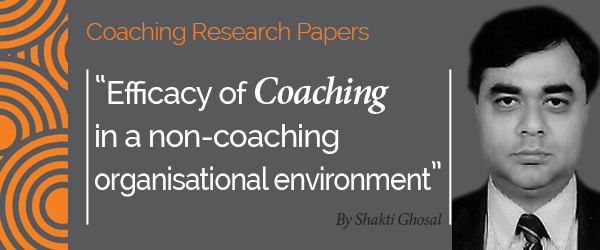Research Paper By Shakti Ghosal
(Leadership and Executive Coach, OMAN)
Section 1 : Introduction
Organizations are increasingly finding that traditional “command and control” Management style is no longer effective in today’s post industrial, knowledge based environment (Hirschhorn, 1990) signifying increasing complexity, flatter organisation structures, networked information flows and just in time development ( Peter Webb, 2006). The requirements are individual empowerment, creativity and performance coupled with rapid response and resilience.
It is largely accepted that Coaching intervention improves employee and organizational resiliency and effectiveness, especially during rapid environmental changes.One of the well known studies reported in “The Manchester Review” concludes that the Organisational return on investment (ROI) is 5.7 times the initial investment in coaching (Joy McGovern, Michael Lindemann et al, 2001)
However there are certain aspects which detract from a widespread use of Coaching.
- Organisations often approach a coaching intervention to fix weakness, because weakness can result in risk and cost. Yet the agenda of the coaching client (deputed employee) is more concerned with how he can develop and play on his strengths. This can become a difficult dynamic for perceived effectiveness and acceptance of Coaching within the organisation. ( Steven Axelrod, 2006)
- Organisations may also lack access and availability of accredited and effective Coach resource specific to the needs of its business and environment.(CIPD Survey,UK, 2009)
- While coaching concept is well understood in developed economies, this is not true in the developing world. Ironically, it is this latter space which today faces significant business challenges and is possibly in need of urgent coaching intervention. Unfortunately Managements lack understanding of what coaching signifies and its delivery potential. This problem is further exacerbated by lack of availability of experienced executive coaches in sufficient numbers.
Section 2 : Study Objective and Research Questions
This study is based on the Hypothesis that use of coaching skills and tools outside a formal coaching process can be beneficial on a wide scale and in a cost effective manner.
The study proposes the following research:
(a) Determine effectiveness of Coaching concepts and tools in Organisations when the concerned participants are not involved in a formal coaching process.
(b) Explore the extent to which use of coaching methodology can catalyse fresh perspective to allow personnel to upgrade their own competencies and organisational effectiveness.
Section 3 : Methodology
The study is based on the following:
1. Workshop Series:
The author is part of the Senior Management team of his organisation, Saud Bahwan Group (SBG) based in the Gulf region He has conducted a set of three workshops themed,
Management perspective shift for our times –a Workshop for self discovery.
The participant target group was Mid level Managers and Supervisors of diverse educational, work and nationality backgrounds from within the group. A total of 87 participants were spread over three sessions.
The stated objective was to catalyse fresh thinking and perspective with relation to how Managers and supervisors perceive and utilise their own competencies. Are their learnt and re-enforced behaviours and responses producing optimal results in today’s fast changing environment? There was no mention of the use of “Coaching” process or concepts.
Workshop details and sequencing is given at Annexure-1
Participant feedback was collated through observations during the workshops as well as post workshop (after a period of one month) face to face sessions to ascertain the extent of perspective shifts and take-aways from the earlier workshop.
Since no formal exposure to the Coaching process was available to the participants, their feedback was without any preconceived bias and solely on their own experience and perception of the various competencies and skills showcased in the Workshop as also their implementation subsequently.
2. Management Survey:
This was using a structured questionnaire (Annexure- 2).The scope of survey was senior management personnel in business associate and client organisations based in Oman, U.A.E., India, United Kingdom and Germany and known to the author. For locally available participants, survey was conducted through face to face sessions. A total of 26 questionnaires were implemented.
Here also, any mention of Coaching process and methods was avoided. The survey urged the participants to base their feedback on past experience alone with no opportunity to specifically try out any of the competencies indicated.
